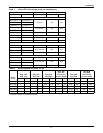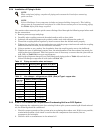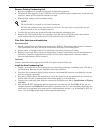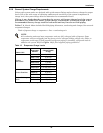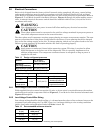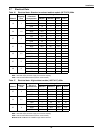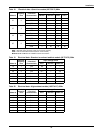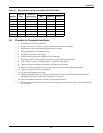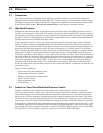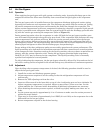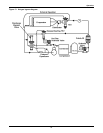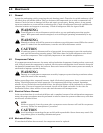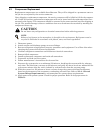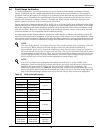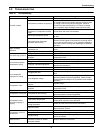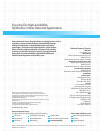
Operation
25
3.0 OPERATION
3.1 Compressor
The scroll compressor is equipped with a band type crankcase heater to resist liquid refrigerant
migration into the compressor during the Off cycle. The three-phase scroll compressor requires proper
phasing to ensure correct motor rotation. The component connections have been phase synchronized
at the factory. Refer to 2.6 - Electrical Connections to verify proper compressor wiring.
3.2 High Head Pressure
Compressor high head pressure is monitored with a pressure switch. One SPDT pressure switch is
used for each compressor in the unit. If head pressure exceeds 400 psig (2760 kPa), the switch opens
the compressor contactor and sends an input signal to the evaporator wall-box control. The high head
pressure condition is acknowledged by pressing the alarm silence button, which will clear the alarm if
the high head pressure condition no longer exists.
If the compressor is off for 1 hour, the control goes into a special cold-start mode. In the cold-start
mode on a call for cooling or dehumidification, the liquid line solenoid valve (LLSV) is energized. If
the high pressure switch does NOT trip within 10 seconds, the control returns to normal operation of
monitoring the high head pressure switch for three occurrences in a 12-hour period. It is a rolling
timer and after the third high head alarm occurs and is acknowledged by the user, it will lock off the
compressor. If while in the cold-start mode the high head pressure switch DOES trip within 10 sec-
onds of the activation of the LLSV, the control does not annunciate the alarm. The control will turn off
the LLSV and delay 10 seconds. The control will permit this occurrence two more times, or a total of
three times. If on the fourth try the high head pressure switch trips within 10 seconds, the control will
annunciate the alarm, turn off the LLSV, wait for the user to acknowledge the alarm and hold the
compressor off for 3 minutes, which is the normal short cycle control. The control will permit this
occurrence three times. On the third occurrence, the control will lock the compressor off until the con-
trol power is reset.
Check for these conditions:
• Power shut off to the condensing unit
• Condensing unit fan not working
• Defective head pressure control valves
• Closed services valves
• Dirty condensing coils
•Crimped lines
3.3 Liebert Lee-Temp Flood Back Head Pressure Control
Outdoor condensing unit components for head pressure control include a receiver, heater and
three-way head pressure control valve. The head pressure control valve operates to maintain a mini-
mum condensing pressure. During low ambient temperature operation, the valve meters discharge
gas into the receiver to maintain a discharge pressure operating against the valve dome. This closes
the condenser port, backing liquid refrigerant into the condenser coil, reducing its area available for
condensing. A receiver sized to hold the additional charge required to flood the condenser is provided.
A temperature-compensated heater maintains the liquid refrigerant pressure during Off cycles. A liq-
uid pressure switch is also installed to turn the heater Off during operation, when the receiver pres-
sure is high. The heater pressure switch has a cutout of 150 PSIG (1034 kPa) and a cut-in of 100 PSIG
(690 kPa). The receiver includes a pressure relief valve set for 475 PSIG (3275 kPa).



